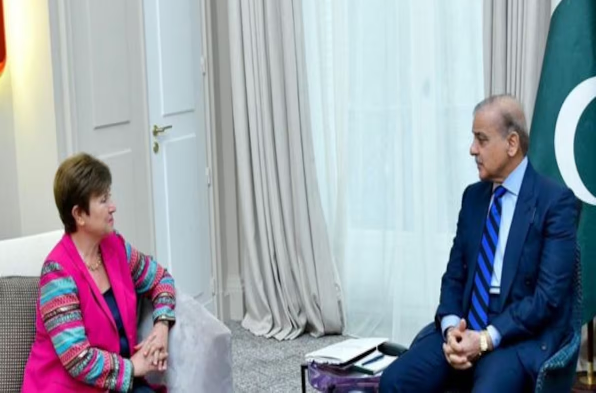KARACHI: Pakistan Stock Exchange above the 98,000 mark on Friday as share prices surged more than 2,000 points in intraday trade
ISLAMABAD: The International Monetary Fund (IMF) has reached a staff-level pact with Pakistan on a $3 billion stand-by arrangement, the lender said, a decision long awaited by the South Asian nation which is teetering on the brink of default.
The deal subject to approval by the IMF board in July comes after an eight-month delay and offers some respite to Pakistan, which is battling an acute balance of payments crisis and falling foreign exchange reserves.
The $3bn funding, spread over nine months, is higher than expected for Pakistan. The country was awaiting the release of the remaining $2.5bn from a $6.5bn bailout package agreed in 2019, which expired on Friday.
The new stand-by arrangement builds on the 2019 programme, IMF official Nathan Porter said in a statement on Thursday, adding that Pakistan’s economy had faced several challenges in recent times, including devastating floods last year and commodity price hikes following the war in Ukraine.
“As a result of these shocks as well as some policy missteps including shortages from constraints on the functioning of the FX market — economic growth has stalled. Inflation, including for essential items, is very high,” he added.
“Despite the authorities’ efforts to reduce imports and the trade deficit, reserves have declined to very low levels. Liquidity conditions in the power sector also remain acute,” Porter said in a statement.
“Given these challenges, the new arrangement would provide a policy anchor and a framework for financial support from multilateral and bilateral partners in the period ahead,” he said.
Meanwhile, the IMF’s press release states, “The IMF staff and the Pakistani authorities have reached a staff-level agreement on policies to be supported by a Stand-By Arrangement (SBA).”
It added that the new SBA will “support the authorities’ immediate efforts to stabilise the economy from recent external shocks, preserve macroeconomic stability and provide a framework for financing from multilateral and bilateral partners”.
“The new SBA will also create space for social and development spending through improved domestic revenue mobilization and careful spending execution to help address the needs of the Pakistani people,” the IMF said.
It further said, “Steadfast policy implementation is key for Pakistan to overcome its current challenges, including through greater fiscal discipline, a market-determined exchange rate to absorb external pressures, and further progress on reforms, particularly in the energy sector, to promote climate resilience, and to help improve the business climate.”
The IMF noted that the parliament had approved the FY24 budget “in line with the goals of supporting fiscal sustainability and mobilising revenue, which will enable greater social and development spending”.
It added that the budget “advances a primary surplus of around 0.4 per cent of GDP by taking some steps to broaden the tax base and increase tax collection from undertaxed sectors, as well as improving progressivity, while ensuring space to strengthen support for the vulnerable through the BISP (Benazir Income Support Program)”.
“It will be important that the budget is executed as planned, and the authorities resist pressures for unbudgeted spending or tax exemptions in the period ahead,” the lender emphasised.
It went on to note that the State Bank of Pakistan (SBP) has “withdrawn the guidance on import prioritisation and is committed to ensuring the full market determination of the exchange rate”.
“Going forward, the SBP should remain proactive to reduce inflation, which particularly affects the most vulnerable, and maintain a foreign exchange framework free of restrictions on payments and transfers for current international transactions and multiple currency practices,” the IMF highlighted.
The press release added: “In addition to generous climate-related pledges from the January 2023 Conference on Climate Resilient Pakistan held in Geneva, the authorities’ efforts have focused on obtaining new financing and securing the rollover of debt falling due.
“This will support near-term policy efforts and replenish gross reserves, with the aim of bringing them to more comfortable levels,” it asserted.
The IMF noted that the “authorities’ program also includes ongoing efforts to strengthen the viability of the energy sector (including through a timely FY24 annual rebasing), improving SOE (state-owned enterprise) governance and strengthening the public investment management framework, including for projects needed to build resilience to climate change”.
The international lender emphasised, “The full and timely implementation of the program will be critical for its success in light of the difficult challenges.”
Following the deal’s securement, Finance Minister Ishaq Dar shared the IMF’s press release while thanking God.
Planning Minister Ahsan Iqbal termed the development “good news”.
He said in a tweet, “Let’s resolve to implement Turn Around Pakistan 5E framework to make our economy strong & sustainable by developing it to its full potential.”
You May Also Like
TEHRAN: The head of Iran’s Revolutionary Guards described the arrest warrant issued by the International Criminal Court for Israeli Prime
LOWER KURRAM: The death toll in yesterday’s gun attack on passenger vans in Khyber Pakhtunkhwa’s Lower Kurram has risen to 42,






